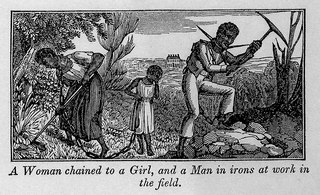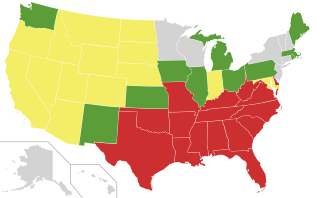Related Research Articles

Juneteenth, officially Juneteenth National Independence Day, is a federal holiday in the United States. It is celebrated annually on June 19 to commemorate the ending of slavery in the United States. The holiday's name is a portmanteau of the words "June" and "nineteenth", as it was on June 19, 1865, when Major General Gordon Granger ordered the final enforcement of the Emancipation Proclamation in Texas at the end of the American Civil War. In the Civil War period, slavery came to an end in various areas of the United States at different times. Many enslaved Southerners escaped, demanded wages, stopped work, or took up arms against the Confederacy of slave states. In January 1865, Congress finally proposed the Thirteenth Amendment to the United States Constitution for national abolition of slavery. By June 1865, almost all enslaved were freed by the victorious Union Army, or abolition laws in some of the remaining U.S. states. When the national abolition amendment was ratified in December, the remaining enslaved in Delaware and in Kentucky were freed.
Reparations for slavery is the application of the concept of reparations to victims of slavery or their descendants. There are concepts for reparations in legal philosophy and reparations in transitional justice. In the US, reparations for slavery have been both given by legal ruling in court and/or given voluntarily by individuals and institutions.

From the first United States Congress in 1789 through the 116th Congress in 2020, 162 African Americans served in Congress. Meanwhile, the total number of all individuals who have served in Congress over that period is 12,348. Between 1789 and 2020, 152 have served in the House of Representatives, nine have served in the Senate, and one has served in both chambers. Voting members have totaled 156, while six others have served as delegates. Party membership has been 131 Democrats and 31 Republicans. While 13 members founded the Congressional Black Caucus in 1971 during the 92nd Congress, in the 116th Congress (2019-2020), 56 served, with 54 Democrats and two Republicans.

In the United States before 1865, a slave state was a state in which slavery and the internal or domestic slave trade were legal, while a free state was one in which they were prohibited. Between 1812 and 1850, it was considered by the slave states to be politically imperative that the number of free states not exceed the number of slave states, so new states were admitted in slave–free pairs. There were, nonetheless, some slaves in most free states up to the 1840 census, and the Fugitive Slave Clause of the U.S. Constitution, as implemented by the Fugitive Slave Act of 1793 and the Fugitive Slave Act of 1850, provided that a slave did not become free by entering a free state and must be returned to their owner. Enforcement of these laws became one of the controversies which arose between slave and free states.
The one-drop rule was a legal principle of racial classification that was prominent in the 20th-century United States. It asserted that any person with even one ancestor of African ancestry is considered black. It is an example of hypodescent, the automatic assignment of children of a mixed union between different socioeconomic or ethnic groups to the group with the lower status, regardless of proportion of ancestry in different groups.

Public Law 103-150, informally known as the Apology Resolution, is a Joint Resolution of the U.S. Congress adopted in 1993 that "acknowledges that the overthrow of the Kingdom of Hawaii occurred with the active participation of agents and citizens of the United States and further acknowledges that the Native Hawaiian people never directly relinquished to the United States their claims to their inherent sovereignty as a people over their national lands, either through the Kingdom of Hawaii or through a plebiscite or referendum". The resolution has been cited as impetus for the Hawaiian sovereignty movement, and has been the subject of debate.

African-American history started with the arrival of Africans to North America in the 16th and 17th centuries. Formerly enslaved Spaniards who had been freed by Francis Drake arrived aboard the Golden Hind at New Albion in California in 1579. The European colonization of the Americas, and the resulting Atlantic slave trade, led to a large-scale transportation of enslaved Africans across the Atlantic; of the roughly 10–12 million Africans who were sold by the Barbary slave trade, either to European slavery or to servitude in the Americas, approximately 388,000 landed in North America. After arriving in various European colonies in North America, the enslaved Africans were sold to white colonists, primarily to work on cash crop plantations. A group of enslaved Africans arrived in the English Virginia Colony in 1619, marking the beginning of slavery in the colonial history of the United States; by 1776, roughly 20% of the British North American population was of African descent, both free and enslaved.

The Civil Liberties Act of 1988 is a United States federal law that granted reparations to Japanese Americans who had been wrongly interned by the United States government during World War II and to "discourage the occurrence of similar injustices and violations of civil liberties in the future". The act was sponsored by California Democratic congressman and former internee Norman Mineta in the House and Hawaii Democrat Senator Spark Matsunaga in the Senate. The bill was supported by the majority of Democrats in Congress, while the majority of Republicans voted against it. The act was signed into law by President Ronald Reagan.

Stephen Ira Cohen is an American attorney and politician serving as the U.S. representative from Tennessee's 9th congressional district since 2007. He is a member of the Democratic Party. The district includes the western three-fourths of Memphis. Cohen is Tennessee's first Jewish congressman and since 2023 has been the dean of and only Democrat in the state's congressional delegation.
This is a timeline of African-American history, the part of history that deals with African Americans.

The African People's Socialist Party (APSP) is a pan-Africanist political party and organization working towards reparations for slavery in the United States, identifying ideologically with African internationalism and African socialism. The party was created in May 1972 by the merger of three black power organizations based in Florida and Kentucky. Omali Yeshitela has been chairman of the APSP since 1972. The APSP leads its sister organization, the Uhuru Movement. Uhuru, pronounced, is Swahili for "freedom". The APSP's stated goals are "to keep the Black Power Movement alive, defend the countless Africans locked up by the counterinsurgency, and develop relationships with Africa and Africans worldwide".
In societies that regard some races or ethnic groups of people as dominant or superior and others as subordinate or inferior, hypodescent refers to the automatic assignment of children of a mixed union to the subordinate group. The opposite practice is hyperdescent, in which children are assigned to the race that is considered dominant or superior.

Global Alliance For Preserving the History of WWII in Asia is a non-profit, non-partisan federation of over 40 grassroots organizations dedicated to the remembrance, redress and reconciliation concerning World War II in Asia, also known as the Pacific War. It is concerned about crimes committed by the Imperial Japanese Army and issues related to them such as the Nanjing Massacre, Unit 731, Comfort women, Prisoners of War and Forced Labor. It aims to bring together such groups electronically, organizationally, and personally. This federation has become increasingly recognized as the leading organization safeguarding humanity and international justice with relation to World War II in Asia and the Pacific and its aftermath. It is also the first organization of its kind since previous similar groups were only focused on one or some aspects of the war.
The Jim Crow laws were state and local laws introduced in the Southern United States in the late 19th and early 20th centuries that enforced racial segregation, "Jim Crow" being a pejorative term for an African American. The last of the Jim Crow laws were generally overturned in 1965. Formal and informal racial segregation policies were present in other areas of the United States as well, even as several states outside the South had banned discrimination in public accommodations and voting. Southern laws were enacted by white-dominated state legislatures (Redeemers) to disenfranchise and remove political and economic gains made by African Americans during the Reconstruction era. Such continuing racial segregation was also supported by the successful Lily-white movement.
Reparations are broadly understood as compensation given for an abuse or injury. The colloquial meaning of reparations has changed substantively over the last century. In the early 1900s, reparations were interstate exchanges that were punitive mechanisms determined by treaty and paid by the surrendering side of a conflict, such as the World War I reparations paid by Germany and its allies. Reparations are now understood as not only war damages but also compensation and other measures provided to victims of severe human rights violations by the parties responsible. The right of the victim of an injury to receive reparations and the duty of the part responsible to provide them has been secured by the United Nations.

In the United States, many U.S. states historically had anti-miscegenation laws which prohibited interracial marriage and, in some states, interracial sexual relations. Some of these laws predated the establishment of the United States, and some dated to the later 17th or early 18th century, a century or more after the complete racialization of slavery. Nine states never enacted anti-miscegenation laws, and 25 states had repealed their laws by 1967. In that year, the U.S. Supreme Court ruled in Loving v. Virginia that such laws are unconstitutional under the Fourteenth Amendment to the U.S. Constitution.

Reparations for slavery refers to providing benefits to victims of slavery and/or their descendants. There are concepts for reparations in legal philosophy and reparations in transitional justice. Reparations can take many forms, including practical and financial assistance to the descendants of enslaved people, acknowledgements or apologies to peoples or nations negatively affected by slavery, or honouring the memories of people who were enslaved by naming things after them. Victims of slavery can refer past slavery or ongoing slavery in the 21st century.

The Legacy Museum: From Enslavement to Mass Incarceration is a museum in Montgomery, Alabama, that displays the history of slavery and racism in America. This includes the enslavement of African-Americans, racial lynchings, segregation, and racial bias.
The California Reparations Task Force was a non-regulatory state agency in California established by California Assembly Bill 3121 in 2020 to study and develop reparation proposals for African Americans, especially those who are descendants of persons enslaved in the United States. It was the country's first statewide reparations task committee and was created to study methods to resolve systemic racism against African Americans resulting from slavery's enduring legacy. The task force was designed to recommend ways to educate the California public of the task force's findings and to propose remedies.
References
- ↑ O'Dell, Larry (February 25, 2007). "Virginia Apologizes for Role in Slavery". The Washington Post.
- ↑ "California apologizes for role in perpetuating slavery amid push for reparations" CBS News, September 26, 2024.
- ↑ "Florida apologizes for role in slavery". Tampa Bay Times. Archived from the original on August 10, 2017. Retrieved August 28, 2017.
- ↑ "House apologizes for slavery, 'Jim Crow' injustices – CNN.com". www.cnn.com. CNN. Retrieved 21 September 2019.
- ↑ Cohen, Steve (29 July 2008). "H.Res.194 – 110th Congress (2007–2008): Apologizing for the enslavement and racial segregation of African-Americans". www.congress.gov. Retrieved 21 September 2019.
- ↑ "Apologizing for the enslavement and racial segregation of African-Americans. (2008 – H.Res. 194)". GovTrack.us.
- ↑ "H. Res. 194: Apologizing for the enslavement and racial segregation of African-Americans" (PDF). Retrieved 21 September 2019.
- ↑ "Congress Apologizes for Slavery, Jim Crow". NPR.org. Retrieved 2022-12-29.
- ↑ "Barack Obama praises Senate slavery apology". www.telegraph.co.uk. 19 June 2009. Retrieved 2022-12-29.
- ↑ Thompson, Krissah (June 19, 2009). "Senate Backs Apology for Slavery". The Washington Post. Retrieved June 21, 2009.